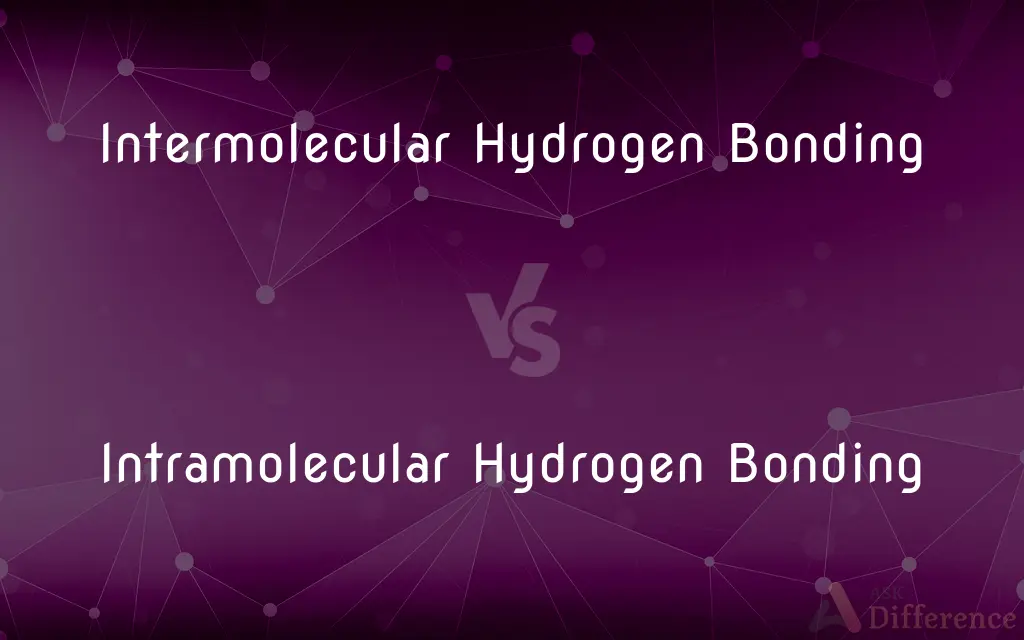Intermolecular Hydrogen Bonding vs. Intramolecular Hydrogen Bonding — What's the Difference?
By Tayyaba Rehman — Published on December 3, 2023
Intermolecular Hydrogen Bonding occurs between separate molecules, while Intramolecular Hydrogen Bonding takes place within a single molecule.

Difference Between Intermolecular Hydrogen Bonding and Intramolecular Hydrogen Bonding
Table of Contents
ADVERTISEMENT
Key Differences
Intermolecular Hydrogen Bonding and Intramolecular Hydrogen Bonding are essential concepts in chemistry, focusing on how hydrogen bonds form. Intermolecular Hydrogen Bonding pertains to hydrogen bonds formed between separate molecules. Conversely, Intramolecular Hydrogen Bonding concerns hydrogen bonds established within a singular molecule itself.
A fundamental understanding of Intermolecular Hydrogen Bonding is evident in cases like water, where hydrogen bonds exist between water molecules. In contrast, Intramolecular Hydrogen Bonding is evident in compounds like ortho-nitrophenol, where the hydrogen bond forms between different parts of the same molecule.
The implications of Intermolecular Hydrogen Bonding are significant in determining physical properties of substances. For instance, the high boiling point of water is due to Intermolecular Hydrogen Bonding between water molecules. However, Intramolecular Hydrogen Bonding often affects chemical reactivity, as the bond may hinder or promote certain reactions within the molecule.
Both Intermolecular Hydrogen Bonding and Intramolecular Hydrogen Bonding contribute to a substance's characteristics and behavior. Intermolecular bonds influence characteristics like boiling and melting points. In contrast, Intramolecular bonds can impact conformation and reactivity.
From a molecular perspective, Intermolecular Hydrogen Bonding promotes cohesion between molecules, lending stability to the system. In contrast, Intramolecular Hydrogen Bonding might cause a molecule to assume a specific shape or conformation, which might be critical for its function or behavior.
ADVERTISEMENT
Comparison Chart
Occurrence
Between separate molecules
Within a single molecule
Example Compound
Water
Ortho-nitrophenol
Impact on Physical Properties
Influences boiling and melting points
Might not significantly affect physical properties
Influence on Chemical Reactivity
Generally less direct impact
Can affect reactivity due to molecular conformation
Contribution in Molecular Systems
Promotes cohesion between molecules
Determines molecular shape or conformation
Compare with Definitions
Intermolecular Hydrogen Bonding
A bond occurring between different molecules.
The high boiling point of water is attributed to Intermolecular Hydrogen Bonding.
Intramolecular Hydrogen Bonding
Affects the conformation of a molecule.
Ortho-nitrophenol has a specific structure due to Intramolecular Hydrogen Bonding.
Intermolecular Hydrogen Bonding
Influences physical properties like boiling points.
Ethanol's boiling point is raised due to Intermolecular Hydrogen Bonding.
Intramolecular Hydrogen Bonding
Can dictate how a molecule reacts.
Certain reactions are facilitated by the presence of Intramolecular Hydrogen Bonding.
Intermolecular Hydrogen Bonding
Bonds that lend stability between separate entities.
Alcohols often showcase Intermolecular Hydrogen Bonding, influencing their properties.
Intramolecular Hydrogen Bonding
Internal bonding changing molecular behavior.
The stability and shape of some bioactive molecules are due to Intramolecular Hydrogen Bonding.
Intermolecular Hydrogen Bonding
Leads to cohesion in molecular systems.
Intermolecular Hydrogen Bonding in ice structures results in its lower density.
Intramolecular Hydrogen Bonding
A bond taking place within one molecule.
The unique shape of some organic compounds results from Intramolecular Hydrogen Bonding.
Intermolecular Hydrogen Bonding
An interaction not confined to a singular molecule.
The viscosity of certain solutions can be traced back to Intermolecular Hydrogen Bonding.
Intramolecular Hydrogen Bonding
Bonds parts of a single molecule together.
The Intramolecular Hydrogen Bonding in some molecules leads to distinct spectral patterns.
Common Curiosities
Which bonding is responsible for water's high boiling point?
Intermolecular Hydrogen Bonding is responsible for water's high boiling point.
Which type of bonding occurs between different molecules?
Intermolecular Hydrogen Bonding occurs between different molecules.
Does Intramolecular Hydrogen Bonding affect molecular shape?
Yes, Intramolecular Hydrogen Bonding can determine a molecule's shape or conformation.
What dictates the specific conformation of certain organic compounds?
Intramolecular Hydrogen Bonding can dictate the specific conformation of certain compounds.
Are ortho-nitrophenol and water examples of Intramolecular or Intermolecular bonding?
Ortho-nitrophenol showcases Intramolecular Hydrogen Bonding, while water demonstrates Intermolecular Hydrogen Bonding.
How can one identify the presence of Intramolecular Hydrogen Bonding in a molecule?
Intramolecular Hydrogen Bonding can often be identified through spectroscopy and studying molecular structures.
Is Intermolecular Hydrogen Bonding exclusive to water?
No, Intermolecular Hydrogen Bonding is found in various substances, not just water.
Which type of bonding is typically responsible for influencing boiling or melting points?
Intermolecular Hydrogen Bonding typically influences boiling or melting points.
Can a single molecule exhibit Intramolecular Hydrogen Bonding?
Yes, Intramolecular Hydrogen Bonding happens within a single molecule.
Can Intermolecular Hydrogen Bonding contribute to the cohesion of a substance?
Yes, Intermolecular Hydrogen Bonding can promote cohesion between molecules in a substance.
Which type of bonding is more influential in determining a substance's physical properties?
Intermolecular Hydrogen Bonding often plays a more direct role in determining physical properties.
How does Intramolecular Hydrogen Bonding affect chemical reactions?
Intramolecular Hydrogen Bonding can affect reactions by promoting or hindering them due to molecular conformation.
Does Intermolecular Hydrogen Bonding play a role in the viscosity of solutions?
Yes, the viscosity of certain solutions can be influenced by Intermolecular Hydrogen Bonding.
What's the significant difference between Intermolecular and Intramolecular Hydrogen Bonding?
Intermolecular occurs between separate molecules, while Intramolecular happens within a single molecule.
Can Intramolecular Hydrogen Bonding influence the behavior of a molecule?
Yes, Intramolecular Hydrogen Bonding can influence a molecule's behavior, including its reactivity.
Share Your Discovery

Previous Comparison
Android 5.1.1 Lollipop vs. 6.0.1 Marshmallow
Next Comparison
Provision Liability vs. Contingent LiabilityAuthor Spotlight
Written by
Tayyaba RehmanTayyaba Rehman is a distinguished writer, currently serving as a primary contributor to askdifference.com. As a researcher in semantics and etymology, Tayyaba's passion for the complexity of languages and their distinctions has found a perfect home on the platform. Tayyaba delves into the intricacies of language, distinguishing between commonly confused words and phrases, thereby providing clarity for readers worldwide.













































